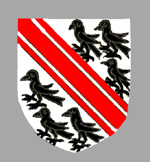The Manor of Goldington
Volume III of The Victoria County History for Bedfordshire was published in 1912 and gives accounts of all the various manors in Goldington. This manor is judged to have had its genesis in the holding of Hugh de Beauchamp of three hides, one virgate in 1086. It is believed that Simon de Beauchamp granted the manor to Newnham Priory on its foundation in the reign of Henry II (1156-1189), probably around 1166, and was held by the priory until it was dissolved by Henry VIII (1509-1547) in 1541.

Arns of the Gostwick family
In 1543 the manor was granted to Sir John Gostwick of Willington, personal paymaster to Thomas Cromwell, who oversaw the dissolution of the religious houses in England. The manor passed in 1545 to Sir John’s daughter-in-law who married Francis Russell, who became 2nd Earl of Bedford in 1555, though this was opposed by her late husband’s uncle William Gostwick. On her death in 1562 her third son, Francis, leased the manor from John, William Gostwick’s son, for sixty years.
In 1598 William Gostwick, son of John Gostwick, disputed the claim of the Earls of Bedford to the manor on the basis that, the month before John Gostwick leased the manor to them he had leased it to someone else. To complicate matters further part of the manor was also leased to another family and by this date was held by the Beecher family, from whom Sir Edward Gostwick recovered it in 1622. By 1630 the Gostwicks again held the whole manor and in that year Sir Edward conveyed it to trustees for his son, who was deaf and dumb but, nevertheless, took an active part in the life of the county as he was otherwise unimpaired.

Arms of the Dukes of Bedford
Sir William Gostwick conveyed all the family’s Bedfordshire property to Sarah, Duchess of Marlborough in 1731. In 1774 Francis, 5th Duke of Bedford, purchased all these lands including Goldington Manor. By the end of the century the manor was in the hands of the Polhill family, remaining with them into the 19th century during which, the Victoria County History assumes the manorial rights probably lapsed.